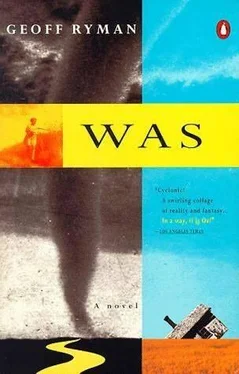"Poor little thing. Fancy not speaking a word of English!"
"She was the soul of courtesy," insisted Aunty Em. "I cannot imagine how her behavior could be in any way improved."
"Perhaps by using less incense so a human body could breathe!" exclaimed the Reverend Parker's wife.
"That was like your nosegay," said Dorothy. "She was frightened that you'd smell."
"Dorothy!" exclaimed Aunty Em. "Apologize to Mrs. Parker." But she sounded less angry than usual.
When they were back in the wagon, Aunty Em laughed. "Dorothy, your mouth!" she said, shaking her head. "The things you come out with! Mind, your mother was the same."
Dorothy could see that she had done something right, but did not understand what it was. Aunty Em was a mystery, to be watched, to be solved.
A few days later, Aunty Em learned that her poem was not to be read at the Church anniversary. Her own suggestion had been taken up. Mrs. Blood in Illinois had been written to, and the old woman had responded with a detailed reminiscence of life in Manhattan's early days. It would be read in full to the congregation, as would Mrs. Parker's poem. Aunty Em had a letter from Miss Mudge, thanking her for all her efforts.
That night Dorothy heard her pacing around and around the little room in silence.
The next morning, Toto slipped his rope and disappeared, into the snow.
Manhattan, Kansas-Spring 1876
Go east, and you hear them laugh at Kansas; go west and they sneer at her; go south and they "cuss" her; go north and they have forgotten her… -William Allen White, in an editorial called "What's the Matter with Kansas?"
Suddenly it was spring in Kansas. There were wildflowers all along the roads and in the thorny hedges. Dorothy was relieved. It was as if some part of life had smiled on her at last.
Today was Sunday, no school, and it was sunny, a strange sort of sunlight that glowed in haze near to the ground. It was comfortable riding in the wagon. Dorothy still had to wear her coat, but the lap robes weren't necessary, and her feet and toes were no longer an agony. It was as if the whole of Kansas had sighed in relief.
Aunty Em was in a strange mood too. In the morning, as she had hitched the mule to the cart, there was a kind of secret smile on her face, and she moved with more of a bounce in her step.
"C'mon, Dorothy, it's just you and me today. Your Uncle Henry don't come, because he don't have the Spirit," said Aunty Em, feeling chummy. "So it's just us two, Dorothy. We're going to go and have our souls raised up like summer flowers. I tell you, when the Spirit moves, you don't mind anything, because God is with you, and nobody can take that away."
They weren't going to church. That was very strange. Meeting was obviously going to be slightly like church, there could be no escape from something holy on a Sunday, but it was obviously something more delicious and exciting, a kind of spring church. Aunty Em clucked her tongue, and the cart jerked forward, and they moved out into the fields.
Dorothy caught her aunty's mood. "We're going to Meeting! We're going to Meeting!" she exclaimed excitedly.
Aunty Em chuckled. "Yes, we are, honey, and we're going to meet all kinds of nice people." There was a kind of snarl in Aunty Em's voice, on the word "nice," that made Dorothy breathless with anticipation. Nice people. It had been so long since she'd met any.
"Nice people," Dorothy repeated. Saying it made her feel small and warm and comforted.
"It'll be like going to church in Lawrence," said Aunty Em. "We just had the one old cottonwood meeting hall, and the sun made the boards curl up, so the wind blew between them, and we'd all sing just to keep warm. Sometimes your grandfather would read the lesson. He had a fine voice for reading, he'd make the words come alive. He would read the Sermon on the Mount and make people weep from the truth of it. That was his most favorite passage in the Bible. And we'd stand up from those wooden benches and sing those grand old hymns just like in New England. And your mama, she was the littlest and she would sing such a sweet little song."
Suddenly Aunty Em was no longer smiling. "I don't suppose your mama ever told you about Lawrence."
Dorothy could feel the sun going behind a cloud. "No, Ma'am."
"She never told you?"
"No, Ma'am."
"Well. That was where we lived first. Kansas was just being settled, and we wanted it settled by Northerners. So the Company was formed to help us move across. We came from New England, Dorothy, from Massachusetts. Your grandfather was one of the first to say he'd go. He was a very brave man. He came all the way across the United States to Kansas, and he was one of the first. He left July 17th, 1854, one of the first thirty men. And it was a triumphant progress. They were cheered at the train stations."
Dorothy half imagined it, the flags and excitement, and people cheering a good man. It was all part of the Meeting feeling.
"Your grandfather wrote letters about it back home to the newspapers, Back East. He was such a lettered man, your grandfather. We followed the next year. I came across when I was thirteen years old. Oh! This was a beautiful country then! Nothing between horizon and horizon. I can still remember my first sight of Lawrence, across the river, in the trees. We came across in the ferry and stayed with such nice people, a minister. He had an Indian servant girl, and she gave me a buffalo rug to sleep on. Then we went out to look at our new house that your grandfather had built."
Aunty Em paused, looked at the fields, the flowers. "I can remember the first time I heard a Western voice. A woman from Iowa. She told us a store had 'a right smart chance of calicoes.' Your mother and I laughed and laughed, and no one could understand why two little Yankee girls would find it funny."
Aunty Em went silent again, listening to the mule. "Anyway," she whispered, "it's the children of the Company we'll be meeting today."
Aunty Em drew a deep and shaky breath.
Lawrence sounded beautiful and happy and full of laughter.
"Lawrence had trees?"
"Lots of them, honey, all over the place."
"And Indians and buffalo?"
"Not so much even then. People were planning to make their living farming. The hunters had already moved on, to places like Wichita."
"Why are we living out here?" Dorothy asked.
Aunty Em's face went darker. "We had to move out here, Dorothy. Didn't your mama ever tell you why?"
Dorothy shook her head.
"Border ruffians attacked the town. Called themselves Federal Marshals and carried the flag of South Carolina."
Aunty Em flicked the reins. "I remember getting up in the morning and seeing them on top of Mount Oread. The birds kept singing, the sun shone, and there were five hundred armed men on the hill. They fired cannon at the Free State Hotel until it fell. They destroyed the office of the Herald of Freedom where your grandfather wrote his paper. They came to arrest him, but he had already given them the slip. They came into our house, all leering, and asking for the man of the house. And I told them they knew where he was, driven from his own home. So they ransacked it. They were as drunk as skunks and singing 'Katy Darling' and 'Lily Dale.' And they read our letters and stole our clothes. They even destroyed the only daguerreotype I had of my mother! Then they set the house on fire. My little sister and I had to push a burning bed through the window. After that, my father thought we would be safer out here."
Aunty Em's rage seemed to subside, then flared up again. "And they did it twice! Once in '56 and again in '63. Only the second time they killed every man they could find. And not only men! They killed boys, children. They even killed babies if they were little boys."
Читать дальше












